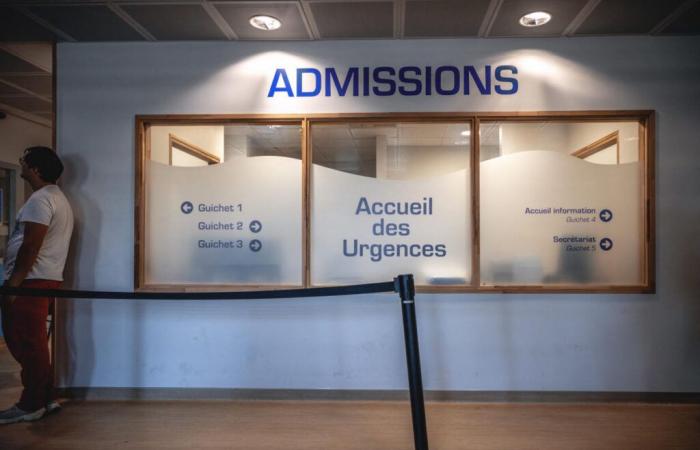Among the subjects of the current negotiations between the Macronists, the right and the extreme right, this is perhaps the most divisive. Since the appointment of Michel Barnier as Prime Minister a little over a week ago, State Medical Aid (AME) has returned to the forefront of the media scene.
Arguing that the elimination of this system was included in the 2021 program of Michel Barnier, then candidate for the investiture of the Republicans (LR) for the presidential election of 2022, certain figures of this party have recently pleaded for a profound transformation of the AME, like the vice-president of the National Assembly, Annie Genevrard.
AME, a subject of discord between LR and the Macronists
This proposal was, however, rejected outright by the presidential camp. Macronist MP for the 2nd constituency of French people living outside France, Eléonore Caroit thus affirmed that she would “fight for state medical aid to be maintained”, while Édouard Philippe, president of the Horizons party, a member of the presidential coalition, judged that eliminating AME would be “a very bad idea”.
Conversely, committing to reforming the AME could allow the future Barnier government to be supported by the National Rally (RN), which has made this subject one of its hobbyhorses for years. The elimination of the system was in fact included in Marine Le Pen’s program in 2022, then in that of Jordan Bardella for the 2024 legislative elections.
The RN considers it a “suction pump for illegal immigration”
For several years now, the right and the far right have justified their focus on the subject of AME by assuring that its existence would have the effect of attracting foreigners to France who wish to benefit from it. A few years ago, RN MEP Jean-Paul Garraud even called it a “suction pump for illegal immigration”.
But what is the reality? Is it true to say that a majority of foreigners arriving in France in an irregular situation intend to “take advantage” of AME? The various studies available on the subject seem in any case to contradict this assumption.
Several reports on AME since 2019
In recent years, AME has been the subject of several successive reports, produced under the direction of different organizations. In 2019, for example, three senior officials from the General Inspectorate of Social Affairs (IGAS) and three others from the General Inspectorate of Finance (IGF) worked on the subject.
Among the observations recorded in their report entitled “State medical aid: diagnosis and proposals”, the authors noted in particular that “the medical typology of beneficiaries of AME and urgent care, evaluated on a hospital sample, suggests numerous cases of migration for care”.
“AME does not appear to be a factor of attractiveness for immigration candidates”
While this formulation could suggest that AME constitutes in itself a reason for immigration to France, another more recent report tends to show that this shortcut is inaccurate and that the situation is in reality much more complex. Commissioned by four ministers of Elizabeth Borne’s government, it was produced by former PS minister Claude Evin and former member of the Council of State Patrick Stefanini, a member of LR.
In its general diagnosis of AME, the report in question indicated that the latter constituted only “one factor among many other determinants of migration”. The numerous hearings carried out by the authors of the report led them to the conclusion that this system “does not appear to be a factor of attractiveness for candidates for immigration”.
9.5% of AME beneficiaries came to France for health reasons
“While comparing the conditions of access to healthcare for foreigners in an irregular situation in Western Europe is difficult and does not allow us to conclude that there is an attractiveness factor likely to direct migratory flows towards France, the hearings that the mission carried out call for the same conclusion,” states the text submitted to the government on December 4, 2023.
In the same report, the authors mentioned a proportion of “9.5%” of AME beneficiaries who would have “come (to France) for a health-related reason”. This figure came from a study carried out in 2019 by the Institute for Research and Documentation in Health Economics (IRDES) and covering a panel of 1,083 people in an irregular situation (adults only) residing in Paris and the Bordeaux metropolitan area.
“Almost no one knows about AME and free healthcare”
However, it would be misleading to equate these “health-related reasons” with a deliberate desire to take advantage of AME. “We spoke with the author of this 2019 study, who explained to us that these people come because our health system is good, but that almost no one is aware of AME and free care,” explains Franceinfo journalist Julie Calderon.
Invited onto the BFM TV set a few days after the publication of his report, Patrick Stefanini had also assured that he was convinced “that we do not immigrate to France to benefit from AME”. “We immigrate to France because we know someone in the diaspora of our country of origin who is settled in France, that we know that we could receive help there, that we are French-speaking, that we come from a country that was once a French colony…”, the honorary State Councilor had then listed, breaking down a prejudice that seems firmly anchored within his political family, as well as in the ranks of the RN.






